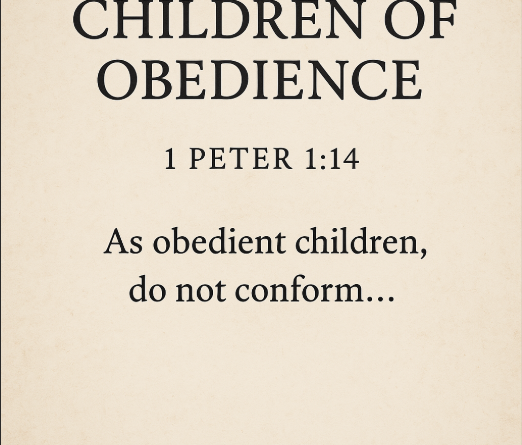Stories Of Obedience In The Bible And What We Learn
You’ve probably come across a dozen sermons, devotionals, or personal notes that point to obedience as a central theme in Scripture. The phrase “stories of obedience in the Bible” captures a thread running from Genesis to Revelation: people responding to God’s voice — sometimes eagerly, sometimes reluctantly, and sometimes after a long struggle. In this article, you’ll walk through some of the most compelling examples, see the lessons they offer, and learn simple ways to apply those lessons in your everyday life.
Why listen to stories of obedience in the Bible?
When you read the Bible, you’re reading narratives — real people making real decisions. Stories of obedience in the Bible give you concrete pictures of what faith looks like in action. They show the consequences of listening and not listening, and they reveal how obedience often aligns with trust, courage, and humility. Rather than abstract commands, these stories let you see obedience embodied, tested, and refined.
What does obedience mean in these stories?
Obedience in the biblical stories isn’t mere rule-following. It’s a posture of the heart — a willingness to align your choices with God’s will even when it costs you something. Across the “stories of obedience in the Bible,” obedience often emerges as trust that transforms fear into action. You’ll notice that obedience sometimes feels like surrender, sometimes like bold faith, and sometimes like patient endurance.
Abraham: Obedience tested, faith refined
Abraham’s willingness to obey God even to the point of offering his son is one of the clearest and most provocative stories of obedience in the Bible. When God told Abraham to sacrifice Isaac, Abraham went ahead with the command, trusting God’s promise that Isaac would be the source of God’s covenant line. You can read the full account and the emotional tension in Genesis 22:1-19.
From Abraham’s story, you learn the relationship between faith and testing: obedience is not always comfortable and sometimes asks you to risk what you value most. Yet his story also shows how God’s purposes can be affirmed even when obedience looks costly. Abraham’s example teaches you that obedience often deepens trust and clarifies God’s faithfulness in surprising ways.

Noah: Obedience against the cultural current
Noah stands out among the stories of obedience in the Bible because he obeyed a command that made no sense to everyone around him. God instructed Noah to build an ark in a world that had never seen anything like a global flood. Noah followed the instructions carefully and faithfully; you can read about his work and God’s promise in Genesis 6:13-22 and the covenant that follows in Genesis 9:12-17.
Noah’s obedience teaches you persistence when you’re called to act against prevailing opinion or culture. It also highlights that obedience can have communal consequences — his faithfulness preserved life for others. When you face opposition or skepticism, remember the way Noah kept building despite the world’s doubt.
Moses: Obedience grows through calling and mediation
Moses is another central figure in the stories of obedience in the Bible. His life shows obedience as a process: a calling (the burning bush), a mission (led Israel out of Egypt), and continual leadership (mediating between God and the people). Read about Moses’ commission in Exodus 3:10 and his role at the Red Sea in Exodus 14:13-14.
From Moses, you learn that obedience may require you to accept a new identity and responsibilities. It often involves advocacy for others, persistence through setbacks, and the courage to lead even when the road is uncertain. Obedience isn’t a one-time act for Moses; it’s a lifetime of return-to-God decisions.
Joshua: Obedience and courageous leadership
Joshua, Moses’ successor, is one of the clearer examples of decisive obedience in the Bible. God commissioned him to lead Israel into the Promised Land, and the famous charge — “Be strong and courageous. Do not be afraid; do not be discouraged, for the Lord your God will be with you wherever you go” — captures the moral tone of his leadership. You can read God’s command to Joshua in Joshua 1:7-9.
Joshua’s story shows you that obedience often pairs with courage. Leadership in obedience means stepping forward when others hesitate, trusting that obedience to God’s word provides guidance and power to overcome opposition. If you’re tasked with leading in your work, family, or community, Joshua’s example is a reminder that obedience and courage go hand in hand.
Samuel: Listening and obeying from youth
Samuel’s calling as a young boy is a testament to attentive obedience. When God called Samuel in the night, he learned to listen and respond: “Speak, for your servant is listening.” Read his calling in 1 Samuel 3:1-10.
Samuel teaches you that obedience begins with listening. It’s not just about action but about being attentive to God’s voice. If you cultivate a posture of listening like Samuel, you’ll be better positioned to obey when the time comes.
Ruth: Loyalty as practical obedience
Ruth’s story is often framed around loyalty and devotion. After Naomi’s loss, Ruth chose to stay with her mother-in-law rather than return to her own people. Her famous words, “Where you go I will go… your people will be my people,” capture the heart of her decision. Read Ruth’s pledge in Ruth 1:16-17.
Ruth shows you that obedience sometimes looks like a lifespan commitment rather than a dramatic act. Her faithfulness led to blessings for herself and for Israel’s future (she became part of David’s lineage). You learn that small, steady acts of loyalty count in the economy of obedience.
Daniel and his friends: Obedience under pressure
Daniel, Shadrach, Meshach, and Abednego are strong examples among the stories of obedience in the Bible when the world pressures you to compromise. Daniel refused to defile himself with the king’s food, choosing prayer and dietary fidelity instead (see Daniel 1:8). Later, Shadrach, Meshach, and Abednego refused to bow to an idol and trusted God even in the fiery furnace (see Daniel 3:16-18).
Their stories teach you courage in the face of social and political pressure. Obedience here is moral clarity — choosing God’s standards when conformity is easier. You also see that obedience may not remove suffering, but it can provide witness and sometimes miraculous deliverance.
Jonah: A cautionary counterpoint among stories of obedience in the Bible
Not every story you’ll read under the label stories of obedience in the Bible is a straightforward success. Jonah gives you the flip side — what happens when you run from God. Jonah initially disobeyed and fled the mission to Nineveh, only to end up learning the cost of resistance through the storm and the fish (see Jonah 1:1-3 and Jonah 3:1-3).
Jonah teaches you that disobedience often produces chaos and may eventually lead you back to obedience. His story also raises questions about resentment, grace, and the breadth of God’s compassion. You learn that obedience sometimes requires letting go of narrow expectations about how God should work.
Mary: Quiet, willing obedience
Mary’s response to the angel Gabriel is one of the more intimate and tender stories of obedience in the Bible. Her “I am the Lord’s servant. May your word to me be fulfilled” demonstrates a humble yes to God’s surprising plan (see Luke 1:38).
Mary teaches you that obedience includes a willing heart that receives God’s purposes, even if they come with uncertainty. Her example reminds you that obedience can be simple and profound — a single word of agreement that redirects your life.
Jesus: The ultimate example of obedience
At the heart of the Christian narrative is Jesus’ obedience. His life, death, and resurrection are framed as obedience to the Father’s will, culminating in his submission even to death on a cross. Paul highlights this in Philippians 2:8, and Hebrews reflects on the lessons learned through Jesus’ suffering in Hebrews 5:8-9.
Jesus’ obedience teaches you the depth and scope of sacrificial submission. It reframes obedience not as mere duty but as redemptive love. If you’re wrestling with obedience as a burden, Jesus’ example shifts the perspective: obedience can be the means of healing and restoration when it’s rooted in love.
Peter and the early church: Obedience in witness
In the early church, obedience often meant proclaiming the gospel in the face of persecution. Peter’s response when the authorities told him to stop preaching is a memorable call to prioritize obedience to God over human directives: “We must obey God rather than human beings” (see Acts 5:29).
From Peter and the apostles, you learn that obedience can bea public witness. Following God’s commands may put you at odds with authorities or expectations, but obedience can also strengthen your faith and embolden your testimony.
Paul: Obedience that transforms life direction
Paul’s conversion story demonstrates obedience as a radical reorientation. Formerly Saul, a persecutor of the church, he encountered the risen Christ and was called to obey a new mission: to take the gospel to the Gentiles (see Acts 9:1-19). His letters then show a lifetime committed to the obedience of mission and pastoral care.
Paul’s life teaches you that obedience can change your trajectory. It’s not just about small choices but about being open to a new calling that reshapes your identity and priorities. When God redirects you, obedience may mean embracing a new vocation.
The cost and reward of obedience in these stories
Across these stories of obedience in the Bible, you’ll see common themes: cost, trust, transformation, and witness. Obedience sometimes involves immediate blessing (Noah, Daniel), testing (Abraham), sometimes social cost (Daniel’s friends), and sometimes mysterious waiting (Joseph’s early trials — Genesis 37-50). You learn that obedience rarely guarantees a pain-free life, but it does shape your character and align you with God’s broader purposes.
Practical lessons you can take from these stories
Every story offers practical steps you can use:
- Cultivate listening: Like Samuel, make space to hear and respond. Practice daily moments of silence and reflection.
- Choose faithful small acts: Like Ruth, make consistent, steady choices that reflect your values.
- Be courageous: Like Joshua and Daniel’s friends, stand firm when cultural pressure tempts compromise.
- Be willing to be surprised: Like Mary and Paul, allow God to redirect your plans and match obedience with humility.
These are simple but powerful ways to turn the lessons from stories of obedience in the Bible into daily practices.
How to read these stories without missing the forest for the trees
When you study stories of obedience in the Bible, it helps to balance two things: the historical-literary context and your contemporary application. Read the passage (using a reliable source like Bible Gateway), ask what it meant in its original context, and then ask how its principle applies to your life. Don’t force modern details into ancient texts, but don’t ignore the direct moral and spiritual implications either.
A practical method: read the passage, note the command or action, ask why it mattered then, and brainstorm one specific way you can practice a similar obedience this week.
Common misconceptions about obedience you might hold
You may have heard obedience framed as mere rule-following or as passive compliance. The stories of obedience in the Bible show you a richer picture: obedience is often active, costly, and relational. It’s not merely legalistic conformity; it’s a lived trust that shapes decision-making, relationships, and character. If you think obedience should bring instant ease, these stories will recalibrate your expectations — obedience can bring both challenge and unexpected blessing.
Obedience in corporate life, family, and personal choices
You don’t need to be a biblical hero to practice obedience in meaningful ways. The patterns from these stories translate into practical contexts:
- In your workplace, obedience might mean integrity when cutting corners seems easier.
- In your family, it could look like patient faithfulness to commitments.
- In personal spiritual life, obedience often starts with small repayments on the discipline of prayer, Scripture reading, and compassion.
These are everyday arenas where the lessons from stories of obedience in the Bible come alive.
When obedience feels unclear: trust without sight
There will be times you can’t see the path ahead, like Abraham going to an unknown place or Noah building before the rain. In these moments, your task is twofold: make the faithful decision you can make now, and stay open to future guidance. Obedience often emerges step by step, not as a single decisive act. Trust that small steps in faithfulness align you with what’s next.
The community dimension of obedience
Many of the stories show that obedience is not a private transaction — it impacts others. Noah’s obedience preserved families; Ruth’s loyalty reshaped a household and nation; Moses’ leadership delivered an entire people. When you obey, you may influence the community around you. Consider who benefits when you choose faithful action and who might be hurt if you choose otherwise.
Learning humility from stories of obedience in the Bible
Humility often accompanies obedience in these stories. Whether it’s Mary’s quiet acceptance, Abraham’s submission, or Jesus’ servanthood, humility is a repeated trait. You learn that obedience frequently requires setting aside pride and trusting that God’s ways are wiser. Humility helps you receive correction, learn from failure, and continue in faithful action.
How to practice obedience without becoming legalistic
One danger you may face is turning obedience into a checklist that crowds out relationships. The stories of obedience in the Bible show that obedience flourishes when it springs from love and trust. Keep a relationship with God (or the heart behind the commands) as your primary motive. Use rules as guides, not replacements for a living connection. Allow grace and truth to coexist: obey out of love, not merely duty.
Obedience, suffering, and endurance
Not all obedient people escape suffering. Abraham, Joseph, Moses, and Paul all faced trials. These stories teach endurance — staying faithful amid pain. When you suffer for obedience, remember you share in a longer story. Your perseverance can become part of a testimony of faith for others.
Reframing fear as a test of obedience
Fear often blocks obedience. The stories of obedience in the Bible show that fear is common — Moses hesitated, Jonah ran, and even the apostles were afraid. The pattern is consistent: acknowledging fear, naming it, and acting anyway moves you from paralysis to faithful action. Courage is not the absence of fear but obedience despite it.
Practical steps you can start today
- Choose one story of obedience in the Bible (for instance, Abraham or Daniel) and read it slowly today on Bible Gateway.
- Reflect on the emotion and the decision in the story — where do you see yourself?
- Identify one practical act of obedience you can take this week (a conversation to have, an honest action at work, a prayerful commitment).
- Share your plan with someone for accountability.
These steps make the ancient stories immediate and actionable.
Final reflections on stories of obedience in the Bible
The “stories of obedience in the Bible” aren’t just historical curiosities; they’re living resources for your moral and spiritual formation. They show courage, failures, second chances, and the surprising ways obedience shapes destiny. You’ll find that obedience is less about perfect performance and more about consistent return to listening, trusting, and acting.
As you revisit these stories — Abraham’s faith, Noah’s persistence, Daniel’s courage, Mary’s humble consent, Jesus’ ultimate submission — let them reshape how you see choices, risk, and reward. Obedience may ask a lot, but it will also give you a deeper sense of direction and purpose.
Explore More
For further reading and encouragement, check out these posts:
👉 7 Bible Verses About Faith in Hard Times
👉 Job’s Faith: What We Can Learn From His Trials
👉 How To Trust God When Everything Falls Apart
👉 Why God Allows Suffering – A Biblical Perspective
👉 Faith Over Fear: How To Stand Strong In Uncertain Seasons
👉 How To Encourage Someone Struggling With Their Faith
👉 5 Prayers for Strength When You’re Feeling Weak

📘 Jesus and the Woman Caught in Adultery – Grace and Mercy Over Judgement
A powerful retelling of John 8:1-11. This book brings to life the depth of forgiveness, mercy, and God’s unwavering love.
👉 Check it now on Amazon 🛒💥
🔥 “Every great message deserves a home online.” 🌍💬🏡
Don’t let your calling stay hidden. Start a Christian blog or website using Hostinger — with 99.9% uptime, a free domain, and SSL, your voice can shine for God’s glory anytime, anywhere.
💥 Begin today. 🛒 Try it RISK-FREE! ✅
✝️ “Your body is God’s temple — care for it with purpose.” 💪💖🏛️
Renew your energy and restore balance naturally. Mitolyn helps support a healthy metabolism, giving you the vitality to live out God’s calling with strength and confidence.
🔥 Unlock Your Metabolic Power! ⚡Burn More Calories & Feel Great With Mitolyn. 💪
👉 Start Today. 🚀 Check Price Now. 🛒💰
💰 As a ClickBank & Amazon Affiliate, I earn from qualifying purchases.
📖 Acknowledgment: All Bible verses referenced in this article were accessed via Bible Gateway (or Bible Hub).
🚀 Want to explore more? 👉 Dive into our new post on Why Jesus? and experience the 🔥 life-changing truth of the Gospel!








